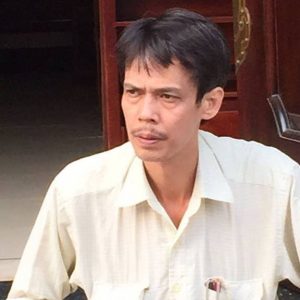In the year leading up to the Vietnamese Communist Party (VCP)’s quinquennial national congresses, it has long been common for the government to tighten up on dissidents as it seeks to forestall any disturbance – no matter how remote – to the country’s landmark political event.
The run-up to the 13th National Congress, which is scheduled to open on January 25, has been no different. According to the organization Human Rights Watch, the past year has seen an intensifying crackdown on dissidents and pro-democracy activists.
The latest to feel the force of the Party’s wrath are three dissident journalists accused of seeking to undermine the Party’s rule. The trial of Pham Chi Dung, Nguyen Tuong Thuy, and Le Huu Minh Tuan, who have each been charged with “making, storing, spreading information, materials, items that contain distorted information about the people’s government,” was scheduled to open today in Ho Chi Minh City. If found guilty, they face up to twenty years’ imprisonment.
Pham Chi Dung, 54, a former communist party member who resigned his membership in 2013 after becoming fed up with the government’s unwillingness to tackle corruption, was arrested in November 2019, apparently in connection to his opposition to the EU-Vietnam free trade agreement. According to the organization Human Rights Watch (HRW), Nguyen Tuong Thuy, a 69-year-old army veteran, was arrested in May 2020, and Le Huu Minh Tuan, 31, the following month.
The three men are affiliated with the Independent Journalists Association of Vietnam (IJAVN), which was founded in July 2014 to advocate for freedom of expression and democratic reforms, and have written frequently for the association’s website Viet Nam Thoi Bao (Vietnam Times). Pham Chi Dung is the president of IJAVN, Nguyen Tuong Thuy is the vice-president, and Le Huu Minh Tuan is the editor.
In addition to their journalistic activities, the trio have been outspoken about the need for democratic reform, and the corruption that exists beneath the carapace of the Party’s rule. They have also tackled the highly combustive issue of China, which remains the subject of reflexive fear and suspicion among large swathes of the Vietnamese public, even as it remains an important economic partner with deep historical ties to the ruling VCP.
In an interview in late 2018, Nguyen Tuong Thuy told me that Chinese support was the only thing keeping an unpopular VCP in power. The two parties “help each other to rule the country. Without the backup of the Chinese communists, the Vietnamese communists could not rule Vietnam any longer,” he said.
In an emailed statement, Phil Robertson of Human Rights Watch said that the upcoming National Congress, which will select key personnel for the next five years, seemed to be the occasion for “a no holds barred crackdown” on dissidents. “If the ruling party is so assured in its leadership,” he said, “it should demonstrate its confidence by respecting civil and political rights, ending its tight control of the press, and allowing independent journalists to freely voice their opinions.”
The independent profit online magazine The Vietnamese opined that “the current regime has put itself in the same position as the feudal monarchies of the past and is sentencing people in a literacy [sic] inquisition.”
The trial of the three dissenting journalists is a reminder that while Vietnam has become an important partner of Western governments seeking to counter China’s rise, its ruling party is far from “like-minded” when it comes to key questions of governance and individual rights.
































